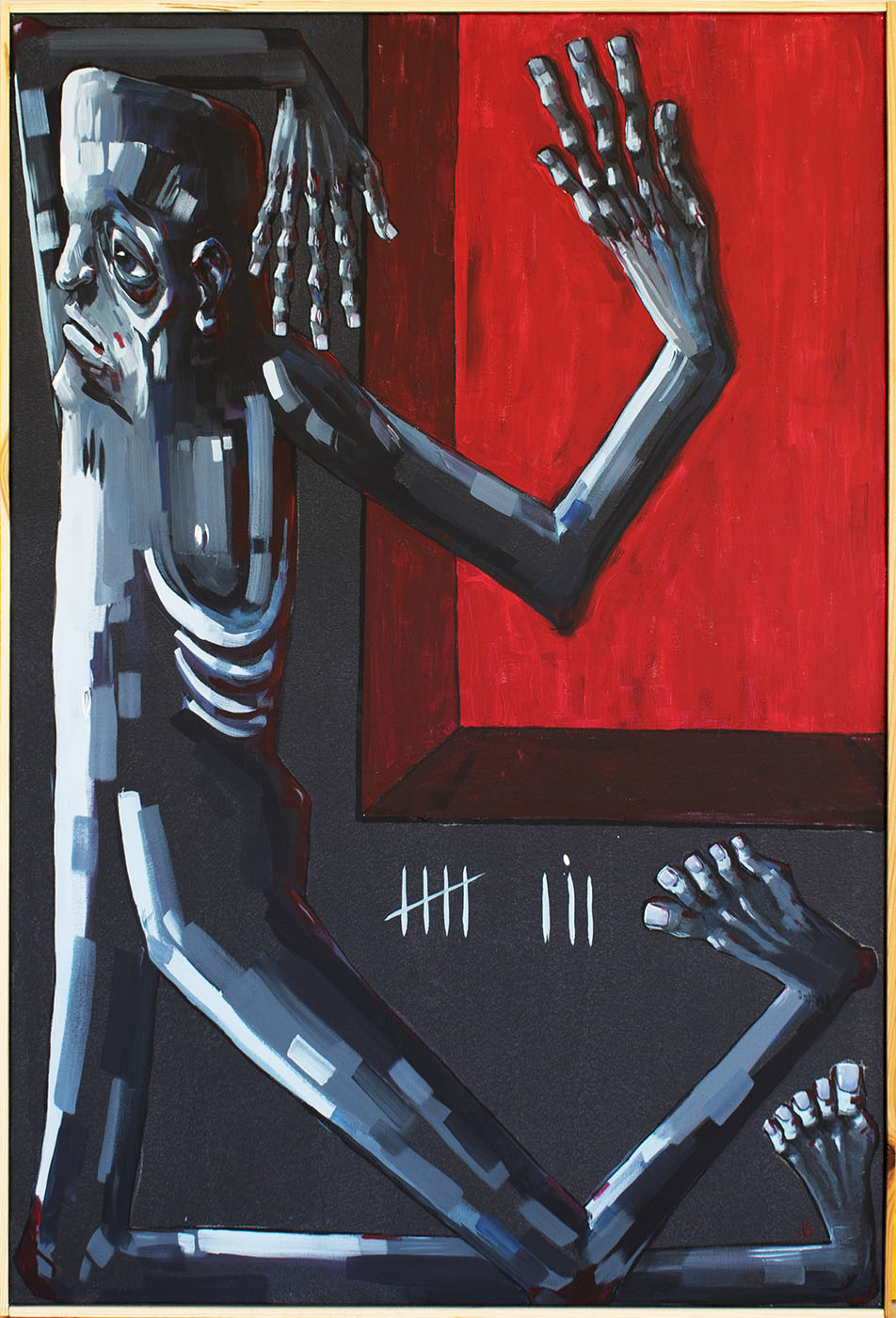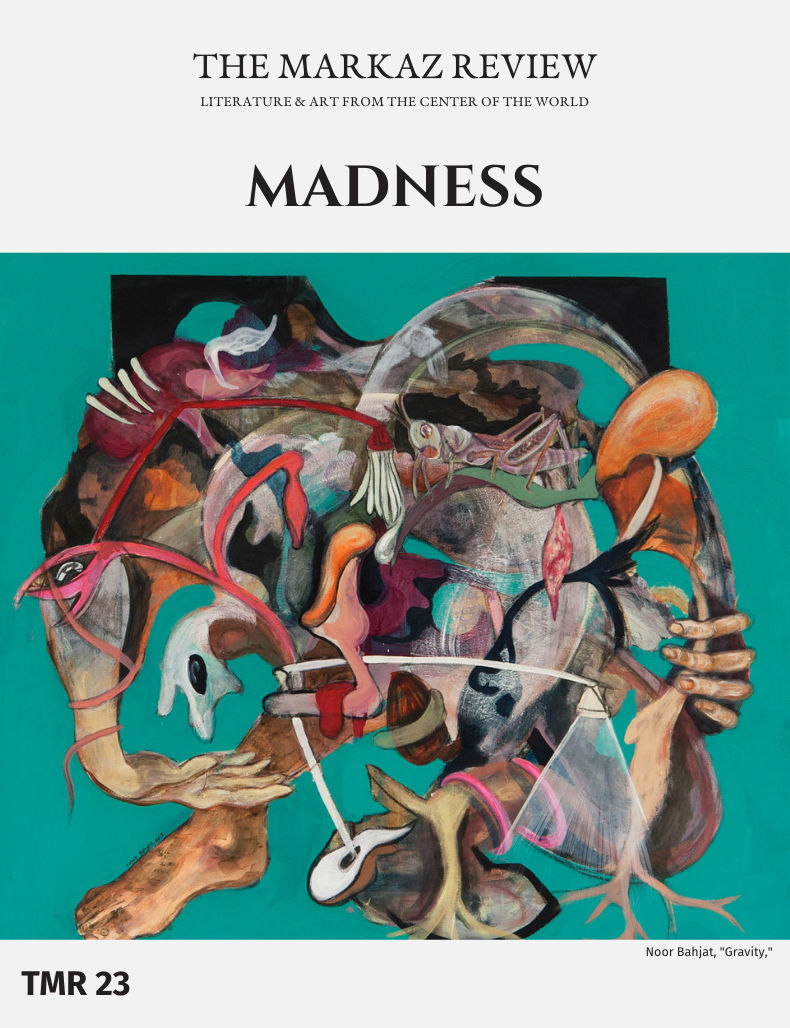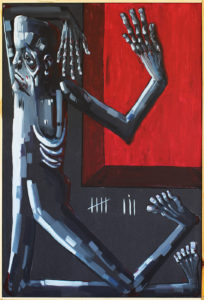A solitary bachelor, seeking success as a writer, wonders what he has to do in contemporary Cairo to get ahead.
Mansi was nervous. He shifted in his seat opposite a desk behind which sat an attractive woman. Her eyeglasses, he noted, seemed only to add to her allure. The unremarkable, even dilapidated desk, appeared as if straining to hold its form, ready to collapse at any moment under the weight of the piles of papers spread across almost every inch of its surface. In fact, now that he took a moment to survey his surroundings, he noticed that the entire office seemed rather shabby and unkempt. It felt suffocating.
Mansi reached up and slightly loosened his tie.
It was a stifling August day and the heat had followed him into the room along with a swarm of flies that flitted about haphazardly from one surface to another. Mansi was annoyed and tired from constantly having to swat away at the bloated ones that were keenly intent on gluing themselves to the sticky sweat running down his face.
The concerto of buzzing flies mixed in with the screeching hum of the whirling, ancient, and useless ceiling fan, succeeded in further rattling his nerves.
As he sat there, he wondered at the reasons that had possessed him to seek this place out, the impetus that had started this whole endeavor. He was an obscure, average writer, who’d managed to publish a few stories and poems, albeit in publications that hardly anyone seemed to read or care about. He longed to bask in the fame and glory that other writers, certainly with less talent than him, enjoyed. He wanted acclaim, recognition and for all to sing the praises of his work. It pained him that no one seemed interested in what he had to say. Despite that, he always got a kick out of seeing his work printed alongside a photo of himself dressed up in his suit, the only one he owned.
Waiting for the woman to look up from her papers, his thoughts drifted back to the day he’d met with his friend at a coffee house in one of Cairo’s oldest and over-crowded quarters. He’d been observing the steam rising from the coffee placed on the dirty table in front of him as his lips puckered around the plastic nib of a hookah’s pipe, drawing in a lungful of air so that the coal burned, and the water at the base of the contraption gurgled, after which he’d exhaled a satisfying breath of smoke out of his nose and mouth that rose into the sky in what seemed like interlacing circles.
“They say,” he told his friend who was sipping quietly at his tea, “that all these famous writers and artists actually sold their souls to the devil for their fame and glory. I despair at the length of my failed state. If it’s true, I’m willing to sell my soul in order to succeed.”
His friend had laughed then. “Books have corrupted your mind,” he said. “No one can sell his soul to the devil.”
Back at home, the notion had kept playing round in Mansi’s mind like a hallucination. Even as he’d sat at his computer, and typed in how to sell your soul to the devil in Google’s search engine, he acknowledged the foolishness of his actions. Mansi trawled through websites on conspiracy theories, celebrity accounts, and all manner of weightless trivia, but seriously doubted he would ever find a concrete answer to his question.
After what seemed like half the night, there it was, a site that despite its need for an updated design was in all other respects the answer to what he was looking for. Spare with information, it nonetheless displayed a number for inquiries and an address. Was this some kind of joke? he’d thought to himself.
And so, this morning, he’d decided to check the authenticity of the address for himself. Joke or not, he reasoned, he couldn’t allow the slimmest possibility of becoming a renowned writer slip away, even if the path he sought was based on a crazy, feckless idea that most likely would, in fact, turn out to be a full blown hoax that he’d naively fallen for.
The address had brought him to a narrow alley lined with old, semi-dilapidated buildings. The street was filthy and rank with foul-smelling water. He could hear the sounds of people quarreling behind doors, children playing in the distance, hurling abusive language that burned at his ears. Dressed in his suit, his presence marked a stark contrast with his surroundings.
He’d finally found the office on the ground floor of a worn-out apartment building. Only a few stories high, the internal layout reminded him of the offices in government establishments. No sooner had he knocked on the door, than a female voice had asked him to enter and sit down, before she’d gone back to her pile of papers.
And, here he was, he noted, still awaiting his turn, his frustration and annoyance gathering momentum.
“… Your name?”
He flinched at the high-pitched voice that had pulled him out of his simmering stupor.
“Mansi,” he replied. “My name is Mansi.”
She jotted that down on a paper in front of her.
“How can I help you, Mr. Mansi?” she asked.
For a brief moment, he was reluctant to mention the advertisement that had brought him to her, worrying that she’d make fun of him, or worse, doubt his sanity. He thought of leaving, but something inside him was willing him to go through with what he had come to do, if only to bring a definite end to this insane situation he found himself in.
Finally, mustering up the courage, he said, “I’m here to sell my soul to the devil.”
He waited for her to laugh at his words, to mock him, to chase him out of the place.
“Did you bring the required documents?” she said instead.
He looked at her, astonished beyond words. “What documents?” he finally managed to say.
She raised her eyebrows in irritation, as she scrutinized him from above her eyeglasses.
“A personal photo, a copy of your government ID card, and a written and signed affidavit that you consent to giving up your soul to the devil once your request has been fulfilled.”
He couldn’t tell at this point if he was confused, or disappointed, at the banal proceedings. But again, what had he been expecting? For the devil himself to be waiting in greeting? He handed her his ID and a personal photo he kept in his wallet for emergencies.
“I didn’t know anything about a statement. Can I write that now?”
The woman reached her hand towards one of the desk drawers and retrieved a plain piece of paper and a pen, which she extended towards him.
He looked down at the white sheet and drew a blank. His mind felt porous, riddled with tiny holes, like a sieve through which his words leaked through until his mind was left empty. A slate clear and clean.
“What do I write?” he asked, his confusion palpable.
She sighed impatiently.
“Write what everyone usually does. I, so and so, pledge to give up my soul to Satan for such and such, and give my full consent to the transaction. Sign it at the bottom and that’s that.”
“But I’m not clearly sure I know what I want,” he said.
“You want what all men want,” she replied, sounding bored now. “Fame, fortune, clout. The phrasing of the request may vary but in the end you all desire the same thing. Just write down the real reason that pushed you to drag your own two feet into our office today.”
“Honestly, I came here thinking this would turn out to be a joke. It seems I was mistaken. So be it, let me think.”
He scratched his head with the tip of the pen.
“I want to be a best-selling author and for my books to fly off the shelf faster than hot cakes,” he told her.
“See, it’s exactly as I predicted. Nobody wants to sell their soul in exchange for world peace, or to bring an end to famines, or to find a cure for cancer. Everyone is here for purely selfish and personal ambition.”
His emotions and facial expressions alternated between shame and anger at the woman’s words. He wanted to explain to her that only desperate people, like him, sold out by everyone, abandoned, and left to wallow in misery and despair, would consider something as mad as selling their souls to the devil. Nobody was deserving of his sacrifice, for where were they when he had needed them most? Before he could formulate any of these thoughts into words, the woman was back to talking again.
“It’s none of my concern what you write really, as long as you make sure to sign your name at the end of it.”
Once he’d written and signed the affidavit and handed it back to the woman, she scanned his ID card, attached his photo to his statement, and tossed the application on top of the pile of papers scattered around her desk.
“Right. All that’s left for you to do is to go home and wait your turn.”
“Turn?” he repeated, incredulous. “My turn?” he repeated.
“Yes, Mr. Mansi, your turn,” she repeated, slower, as if he were an imbecile. “You’re not the only one who wants to sell his soul. These papers are all requests from customers. We run quite a complicated operation and it will take time.”
The feeling returned to Mansi that he might yet be the victim of a ridiculous prank. After all, the whole situation hadn’t lost any of its absurdity.
“I didn’t know there’d be such a long waiting list,” he said to the woman, his tone dripping with sarcasm.
“Did you really think you were the only one to come up with this ingenious solution to your troubles?” said the woman, matching his sarcasm with her own. “Do you not see all these papers? They’re all applications submitted by writers like you, as well as actors, singers, footballers, and so many lottery hopefuls. As I said, the process is intricate, and requires your patience. We can’t have everyone winning the jackpot at the same time now, can we? Do you understand what I’m saying?”
“Yes,” he answered begrudgingly. “But…” he trailed, his bewilderment and distress getting the better of him. His tongue felt heavy all of a sudden, and the sweltering heat had intensified so that he felt like he was suffocating. He reached up and loosened his tie for the second time that day. And the flies, which seemed to have woken up from slumber, had returned with a frenzy that was driving him batty.
“So, I don’t get to meet with the devil? I certainly didn’t expect my business to be concluded with his assistant.”
“No one can see the devil,” she said, raising one eyebrow high, and pinning him with a piercing stare. “I thought you knew that, Mr. Mansi.”
For an instant, he held her gaze before he bowed his head towards her in acquiescence.
Mansi stood up and headed toward the exit, leaving behind him the susurrant screech of the fan, the tormenting frenzy of the flies, and a paper bearing his signature in which, in his own handwriting, he had pledged his soul to the devil.
Mansi never told anyone about that day.
He lived his days in the hope that his turn would come soon and that his wish, as promised, would be fulfilled. And so, he waited.
Days, then months, passed and he went back to questioning whether his meeting with the woman had been nothing more than a prank he’d stupidly gone along with, one set up by evil, sick-minded individuals who got a kick out of preying on the desperation and desolation of the ill of mind and spirit. Soon the years began to go by, too, and he doubted whether the entire incident had happened at all. With each passing day he was more and more convinced that what he’d really experienced was nothing more than a fantastical nightmare. A hallucination.
In the meantime, Mansi worked on a new novel. Once it was published, he resigned himself that this one, just like all the other ones that had preceded it, would end up as fodder for the warehouse moths. However, this time was different. Critics hailed his novel, newspapers wrote about him, and readers rushed out to buy his book. Overnight, Mansi had become the toast of the town and the name on everyone’s lips.
Initially, he felt a joy like none he had ever experienced. He relished every moment, basking in the warmth of the fame and glory he’d spent years waiting and hoping for.
It wasn’t long, though, before fear crept up on him, setting up residence in his heart. As he recollected the details of the pact he’d made in the presence of that woman in that stifling office, the weight of what he had done began to gnaw on his conscience. Over the years he’d managed to convince himself that his sojourn into that alley had never really happened, the whole incident a mere figment of a troubled imagination. Every day he’d question himself whether anything was ever worth selling one’s soul to the devil for.
As Mansi’s fame and fortune increased, so did his depression deepen, and insomnia set in. Everyone wondered at the reasons behind his haggard and drawn appearance, the dark circles under his eyes, the misery that overwhelmed him. It ate at him that he couldn’t tell anyone the truth, not even the psychiatrist he could now afford. Bit by bit, it dawned on Mansi that it wasn’t fame, fortune, or glory that he needed most, but the soul he’d thoughtlessly given away on that day, which he now wanted back.
It had been years since he’d made his way to that alley, to that apartment building and to that office. It seemed as if time had unravelled back on itself to that same August day, with its stifling heat and suffocating warmth. The lane itself hadn’t changed, its inhabitants regarding him with suspicion as he walked through. He stood out like a sore thumb in his luxurious new suit, one of several that he now owned.
He barged through the door without knocking and found the woman sitting at her desk, absorbed, just as she had been the first time he’d been there, with whatever it was she was always writing on those papers. His rude intrusion had unruffled her, for he noticed her eyeing him with a look of disapproval.
“Perhaps you don’t remember me,” he rushed to say before she could open her mouth. “I was here a few years ago.”
She furrowed her brows in concentration.
“Yes, I remember you. You’re that writer. Mr. Mansi if I recall correctly? What can I do for you today?” she said.
“I’m distraught and only you can help me,” he said.
“Rest assured,” she answered, “we can certainly ease any burden. However, you’re still on the waiting list, and your turn hasn’t come yet. You’ve waited this long, surely you can go a while longer.”
Mansi was stunned. His legs felt wobbly and the room began to spin around him. His thoughts were jumbled as they raced through his mind. What was she talking about? He couldn’t possibly be on the waiting list, he told himself, not after all the good fortune he’d enjoyed since his last visit to this place. The woman had to be mistaken. But what if she wasn’t? he asked himself. Did he dare believe that his fame and fortune had had nothing to do with his pact with the devil? That it had been a success long overdue, one borne out of hard work and persistence? Is that what all this meant?
“I’m here to withdraw my application,” Mansi announced.
“Have you lost your mind?” asked the woman, incensed.
“That may be so,” he said. “Although I’ve never felt more rational in my entire life.”
“This is most unusual. I don’t think we’ve had anyone dare to renege before. I’ll have to consult the agency’s guidebook on this one. Give me a moment, please.”
His heart sank. What if the manual stated that he couldn’t have his application back, or that a deal with the devil could never be rescinded? What was he to do then?
The suspense of the wait combined with the room’s stifling heat was getting to him. Nauseous and dizzy, he sat down in the same chair he’d occupied that very first time he’d been to the office all those years ago. As the minutes crept by, it seemed to Mansi like he’d been waiting for an eternity. He shifted uncomfortably in his seat, silently willing the woman to put an end to his misery. The sooner he could put all this nonsense behind him, the better.
“Only a minute longer, and we’ll have this solved one way or the other,” the woman said, as if reading his mind.
Mansi desperately wished he could gauge from the tone of her voice which way his day was headed. By then, he knew he was clutching at straws but desperate times require desperate measures, he thought. Just as he was about to ask her another question, the woman cleared her throat.
“Well, it’s as I thought,” she said. “It seems that once an application has been received by the devil, backing out of the deal is no longer an option. In fact, doing so incurs rather unfortunate, by which I mean painful, consequences to the applicant. You must understand that we conduct a serious operation here. A pact with the devil is no trivial matter. Therefore, I’m sure you’ll understand that the punishment should be deserving of the gravity of the deal at stake. This is the Devil, Satan, the Shaytan himself, and he does not appreciate any disrespect or waste of his precious time.”
Mansi blanched. It was all over. The game was up. All he could think of was how a moment’s insane lapse of judgment, fueled by a rabid desire for fame and glory, had reduced him to this infernal wretched state of affairs. He had no one to blame but himself.
“I’m asking you one more time, Mr. Mansi, are you sure you want to proceed with your request?”
Later, if anyone ever asked him why he had gone ahead with what he had done, his honest reply would be that he didn’t know what had possessed him. All he’d been thinking of was a compelling need to set things right in the only way he knew how, even if it meant risking everything, including his life.
“Yes,” he replied. He repeated his answer a second time, his tone more forceful and confident.
And just like that, for the first time that day, the woman smiled.
“It seems this is your lucky day, Mr. Mansi. It appears, as per the guidebook, that as your request is still pending on our waiting list, it hasn’t been seen by the devil yet, which means you are free to withdraw your application with no strings attached.”
With that, the woman moved a pile of yellowed papers behind which some old files appeared to be arranged in alphabetical order. She searched for Mansi’s name, found his application, and placed it on the desk in front of him.
Mansi could hardly believe this incredible turn of events. But — just as he was about to reach forward to grab the paper — the woman raised her index finger in warning.
“Think carefully. If you go through with this, you’ll lose your place in line. Should you decide to submit a new application, you’ll be relegated to the bottom of the list again.”
Delirious with relief and happiness, he snatched the paper off the desk, and held it in both hands.
“May your waiting list go to hell,” he said, a manic laugh already bubbling its way out of his parted lips as he registered the absurdity of what he’d just said. By this point, Mansi was beyond caring. He’d got what he’d come for, and all he desired now was to put as much distance between himself and this place as he possibly could.
With his sworn statement in hand, Mansi stepped outside into the alley. He tore the damned thing into tiny little pieces that scattered everywhere, in a sudden gust of hot wind. For the last time, he turned on his heels and headed home, his hysterical guffaws bouncing off the walls of the alley’s battered buildings.

























